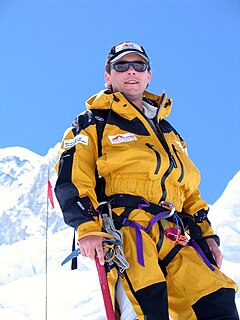A blog is a discussion or informational website published on the World Wide Web consisting of discrete, often informal diary-style text entries (posts). Posts are typically displayed in reverse chronological order, so that the most recent post appears first, at the top of the web page. Until 2009, blogs were usually the work of a single individual, occasionally of a small group, and often covered a single subject or topic. In the 2010s, "multi-author blogs" (MABs) emerged, featuring the writing of multiple authors and sometimes professionally edited. MABs from newspapers, other media outlets, universities, think tanks, advocacy groups, and similar institutions account for an increasing quantity of blog traffic. The rise of Twitter and other "microblogging" systems helps integrate MABs and single-author blogs into the news media. Blog can also be used as a verb, meaning to maintain or add content to a blog.

Authentication is the act of proving an assertion, such as the identity of a computer system user. In contrast with identification, the act of indicating a person or thing's identity, authentication is the process of verifying that identity. It might involve validating personal identity documents, verifying the authenticity of a website with a digital certificate, determining the age of an artifact by carbon dating, or ensuring that a product or document is not counterfeit.
Teen magazines are magazines aimed at teenage readers. They usually consist of gossip, news, fashion tips and interviews and may include posters, stickers, small samples of cosmetics or other products and inserts.
Cold reading is a set of techniques used by mentalists, psychics, fortune-tellers, and mediums. Without prior knowledge, a practiced cold-reader can quickly obtain a great deal of information by analyzing the person's body language, age, clothing or fashion, hairstyle, gender, sexual orientation, religion, ethnicity, level of education, manner of speech, place of origin, etc. during a line of questioning. Cold readings commonly employ high-probability guesses, quickly picking up on signals as to whether their guesses are in the right direction or not, then emphasizing and reinforcing chance connections and quickly moving on from missed guesses. Psychologists believe that this appears to work because of the Forer effect and due to confirmation biases within people.

Identity theft occurs when someone uses another person's personal identifying information, like their name, identifying number, or credit card number, without their permission, to commit fraud or other crimes. The term identity theft was coined in 1964. Since that time, the definition of identity theft has been statutorily defined throughout both the U.K. and the United States as the theft of personally identifiable information. Identity theft deliberately uses someone else's identity as a method to gain financial advantages or obtain credit and other benefits, and perhaps to cause other person's disadvantages or loss. The person whose identity has been stolen may suffer adverse consequences, especially if they are falsely held responsible for the perpetrator's actions. Personally identifiable information generally includes a person's name, date of birth, social security number, driver's license number, bank account or credit card numbers, PINs, electronic signatures, fingerprints, passwords, or any other information that can be used to access a person's financial resources.

Health care or healthcare is the maintenance or improvement of health via the prevention, diagnosis, treatment, amelioration, or cure of disease, illness, injury, and other physical and mental impairments in people. Health care is delivered by health professionals and allied health fields. Medicine, dentistry, pharmacy, midwifery, nursing, optometry, audiology, psychology, occupational therapy, physical therapy, athletic training, and other health professions are all part of health care. It includes work done in providing primary care, secondary care, and tertiary care, as well as in public health.

David Raymond Sedaris is an American humorist, comedian, author, and radio contributor. He was publicly recognized in 1992 when National Public Radio broadcast his essay "Santaland Diaries". He published his first collection of essays and short stories, Barrel Fever, in 1994. He is the brother and writing collaborator of actor Amy Sedaris.

A personal identification number (PIN), or sometimes redundantly a PIN number or PIN code, is a numeric passcode used in the process of authenticating a user accessing a system.
Affiliate marketing is a type of performance-based marketing in which a business rewards one or more affiliates for each visitor or customer brought by the affiliate's own marketing efforts.

Fantastic Voyage: Live Long Enough to Live Forever is a book authored by Ray Kurzweil and Terry Grossman published in 2004. The basic premise of the book is that if middle aged people can live long enough, until approximately 120 years, they will be able to live forever—as humanity overcomes all diseases and old age itself. This might also be considered a break-even scenario where developments made during a year increase life expectancy by more than one year. Biogerontologist Aubrey de Grey called this the "Longevity escape velocity" in a 2005 TED talk.
Subjective validation, sometimes called personal validation effect, is a cognitive bias by which people will consider a statement or another piece of information to be correct if it has any personal meaning or significance to them. People whose opinion is affected by subjective validation will perceive two unrelated events to be related because their personal beliefs demand that they be related. Closely related to the Forer effect, subjective validation is an important element in cold reading. It is considered to be the main reason behind most reports of paranormal phenomena. According to Bob Carroll, psychologist Ray Hyman is considered to be the foremost expert on subjective validation and cold reading.

Liberty Medical Supply, Inc. is a home delivery service that sells diabetes testing supplies, prescription drugs, urology supplies, and ostomy supplies directly to consumers. The company was a subsidiary of Medco Health Solutions, Inc., which purchased Liberty Medical and its parent company, PolyMedica, in 2007. After Express Scripts acquired Medco, they sold Liberty Medical in December 2012 to members of its management team, and it now operates again as an independent company. Liberty Medical's corporate headquarters is located in Port St. Lucie, Florida. The company was one of the city's largest employers with as many as 2,432 employees in 2012. By the end of 2013, the company headquarters employed as few as 940 employees, adding to the community's jobless rate of over 9%, and implemented 20% pay cuts for all employees.
MedHelp is an American private corporation that was founded in February 1994 and pioneered the field of consumer health information and communities on the Internet, before WebMD, Microsoft or Yahoo!.
Amazon Kindle is a series of e-readers designed and marketed by Amazon. Amazon Kindle devices enable users to browse, buy, download, and read e-books, newspapers, magazines and other digital media via wireless networking to the Kindle Store. The hardware platform, which Amazon subsidiary Lab126 developed, began as a single device in 2007. Currently, it comprises a range of devices, including e-readers with E Ink electronic paper displays and Kindle applications on all major computing platforms. All Kindle devices integrate with Kindle Store content and, as of March 2018, the store had over six million e-books available in the United States.
Suzanne Elder is a Chicago community activist and public health leader who has worked on school, health care, and community issues. Elder is also noted for her candidacy in the 2008 Democratic primary where she challenged the party's practice of preselection in lieu of election.

William H. Cross is an American mountain climber. In May 2006 he summited Mount Everest.
Beth Kobliner is an American personal finance commentator and journalist, and author of the New York Times bestsellers Get a Financial Life: Personal Finance in Your Twenties and Thirties. and Make Your Kid a Money Genius . In 2010, she was appointed by President Obama to the President's Advisory Council on Financial Capability, and was instrumental in developing the council's Money as You Grow initiative. The site, MoneyAsYouGrow.org, has reached over one million visitors. In February 2014, Kobliner was appointed by President Obama to the President's Advisory Council on Financial Capability for Young Americans.
Health blogs are niche blogs that cover health topics, events and/or related content of the health industry and the general community.

Brad Feld is an American entrepreneur, author, blogger, and venture capitalist at Foundry Group in Boulder, Colorado, a firm he started with partners Seth Levine, Ryan McIntyre, and Jason Mendelson.
Dan Hurley is an American health and medical journalist and author. He has written several books and contributed pieces to The New York Times, Wired, The Washington Post, Neurology Today and The Atlantic.









